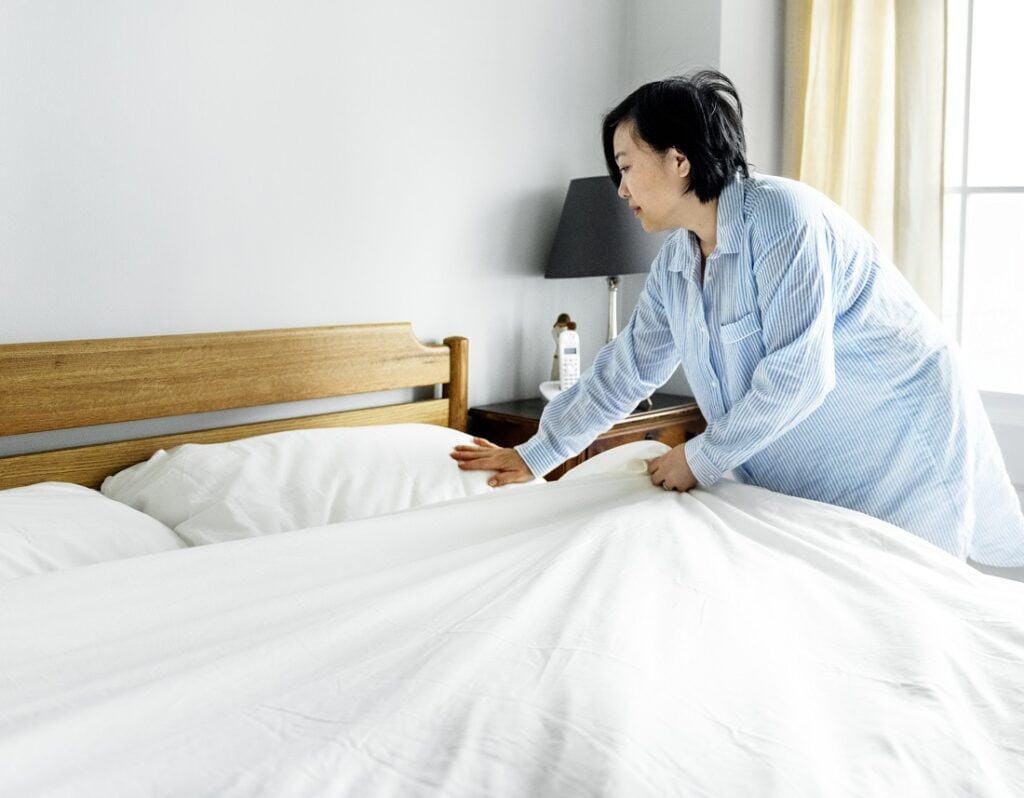With the rise in mental health awareness, many people have become aware of the positive impact following a correct sleeping schedule can have on their wellbeing. Good sleep hygiene can improve your mood, make you feel more energetic, improve your memory and concentration, or simply make you happier.
However, maintaining proper sleep habits may not be enough to get good quality sleep. In fact, many external factors can affect it, such as light and noise pollution, the firmness of your mattress, or even the temperature in your room. The good news is that you can quickly improve your rest by taking straightforward measures to reduce the negative impact of these factors. What’s more, you can do it in a cheap and relatively effortless way.
From avoiding using smartphones right before bed to investing in a white noise machine, here are six simple steps you can take to improve your sleep quality.
1. Prepare Your Bed
A night of good sleep starts with a well-prepared bed, so this is the first thing you need to do to improve your sleep quality. Invest in the right mattress, as a too firm or too soft sleeping surface can cause back pain or discomfort during sleep. You should probably find a mattress that is right in the middle, as it will provide you with the best support and comfort.
It would help if you also tried out various types of pillows and blankets to find the ones that are best suited to you. For example, a memory foam pillow can be the perfect choice for people with back pain, while a down pillow can be the most optimal option if you have allergies or asthma. If you find it challenging to fall asleep without the feeling of a blanket on your body, try using a weighted blanket.
2. Meditate
Meditation is an excellent way to relax, as it can improve your focus, productivity, and mood. Meditating before bed allows you to calm down your mind and prepare it for sleep. It also helps you to relax your muscles and reduce stress.
Meditation can be done in several ways. For instance, you can do it by focusing on your breath or your body. The key is to choose a meditation technique that works for you, so you can easily fall asleep right after.
3. Avoid Using Your Smartphone Before Bed
It is alarming how much time we spend on our smartphones nowadays. This constant connection to the world around us affects our sleep in many ways, as the light emitted by our mobile devices can make it difficult to stay asleep.
The blue light that emanates from your smartphone screen can also cause an alertness response in your brain, making it harder for you to fall asleep. Thus, the best thing you can do is to turn off your phone sometime before bed and avoid using it during nighttime hours as much as possible.
4. Invest in a White Noise Machine
Sometimes you can’t just block out all the sound around you, whether it’s from a noisy street or a neighbor playing loud music. A white noise machine is an excellent way to block out such unwanted sounds, creating a comforting atmosphere that helps you fall asleep. The constant sound of a fan or waterfall creates a soothing environment that can help you relax before bed.
5. Reduce Daytime Naps
Even though naps are one of the best ways to refresh your body and mind, they can also negatively impact your sleep at night. Limiting daytime naps to 15 minutes is recommended to ensure you don’t put your circadian rhythm out of order.
Frequent naps can have a detrimental effect on your sleep, especially when you take more than one nap a day. If you do so, your body gets used to the short sleep cycles and ends up being unable to fall asleep for a longer period at night. Thus, if you need a nap, try to plan your day around it so you can take a short nap at a specific time every day.

6. Prepare Your Bedroom for a Good Night’s Sleep
The environment in which we sleep can significantly impact the quality of our sleep. Thus, it is crucial to make your bedroom as quiet and dark as possible. The ideal temperature for a bedroom is between 60 and 67 degrees Fahrenheit, so keep the temperature in your room at night at a reasonable level to fall asleep faster.
Furthermore, if possible, opt for an air purifier or an air conditioner, as it can reduce the amount of dust and pollen in your room. As dust can cause allergies, it can make it difficult for you to fall asleep or lead you to wake up with your nose blocked.
To Sum Up
Improving your sleep quality is easier than you may think. Most of the time, it only takes a few minor changes to make a big difference.
Maintaining a healthy sleeping schedule, avoiding using your smartphone right before bedtime, and choosing the right mattress are some of the best ways to improve your sleep quality. You can also reduce your daytime naps, invest in a white noise machine, or upgrade your bed.
Sometimes, these simple steps are all it takes to get a better night’s sleep. So, try them out to see just how much they can improve your sleep quality. Good luck!


